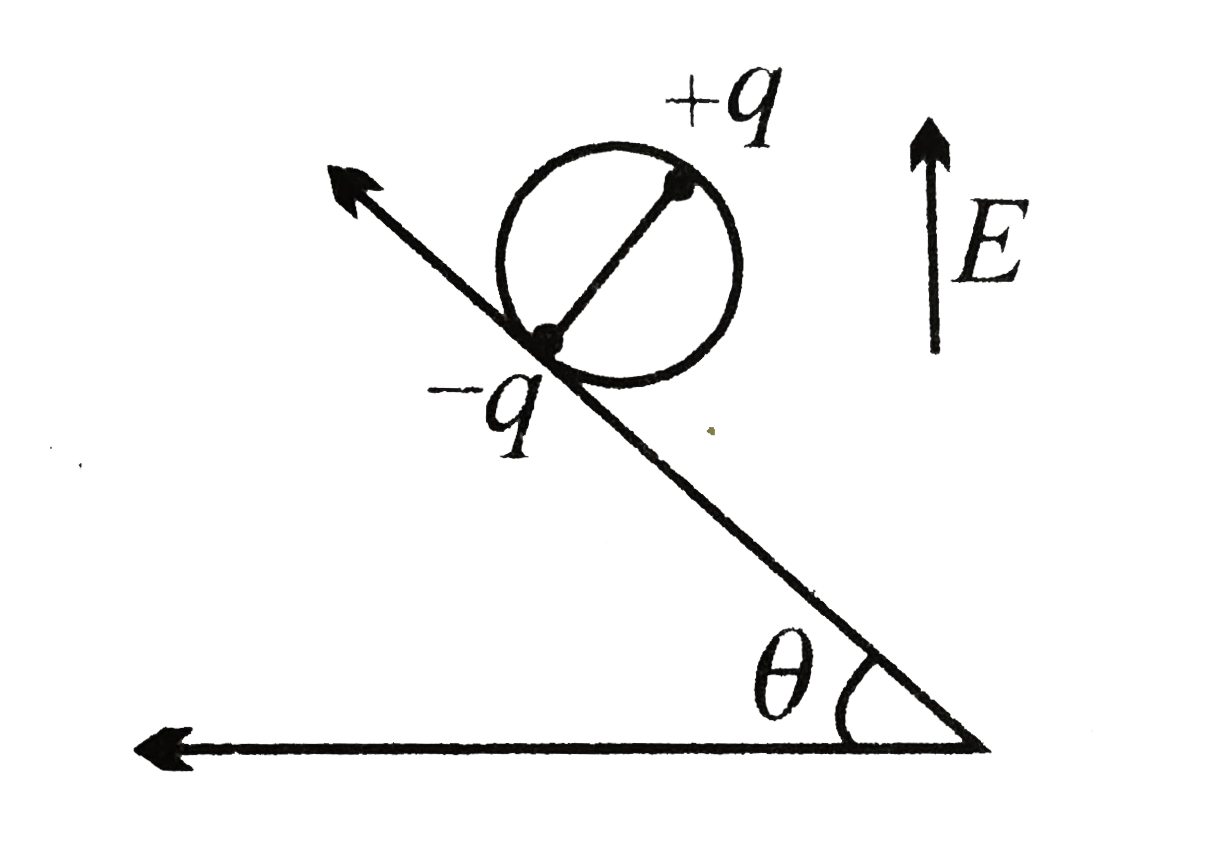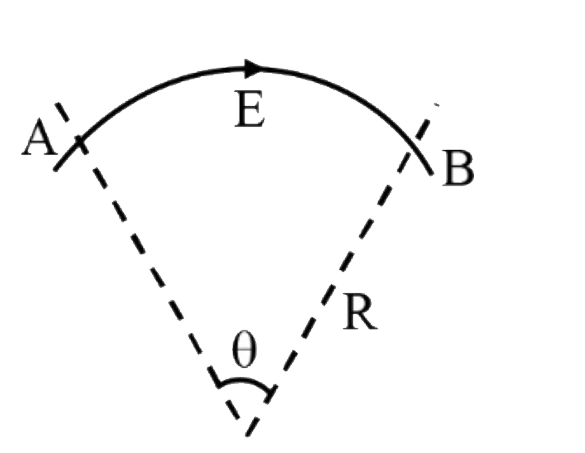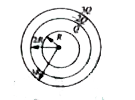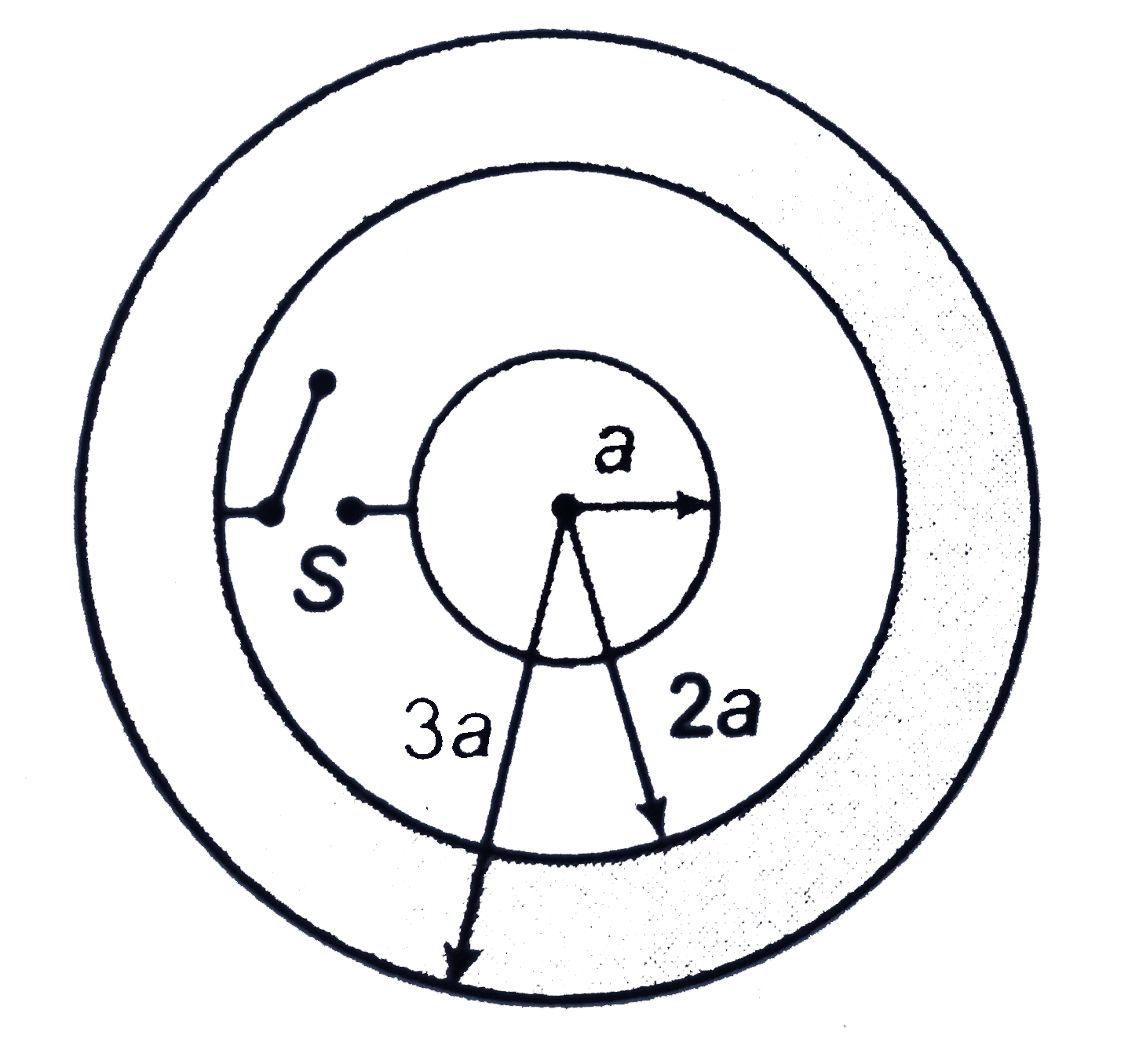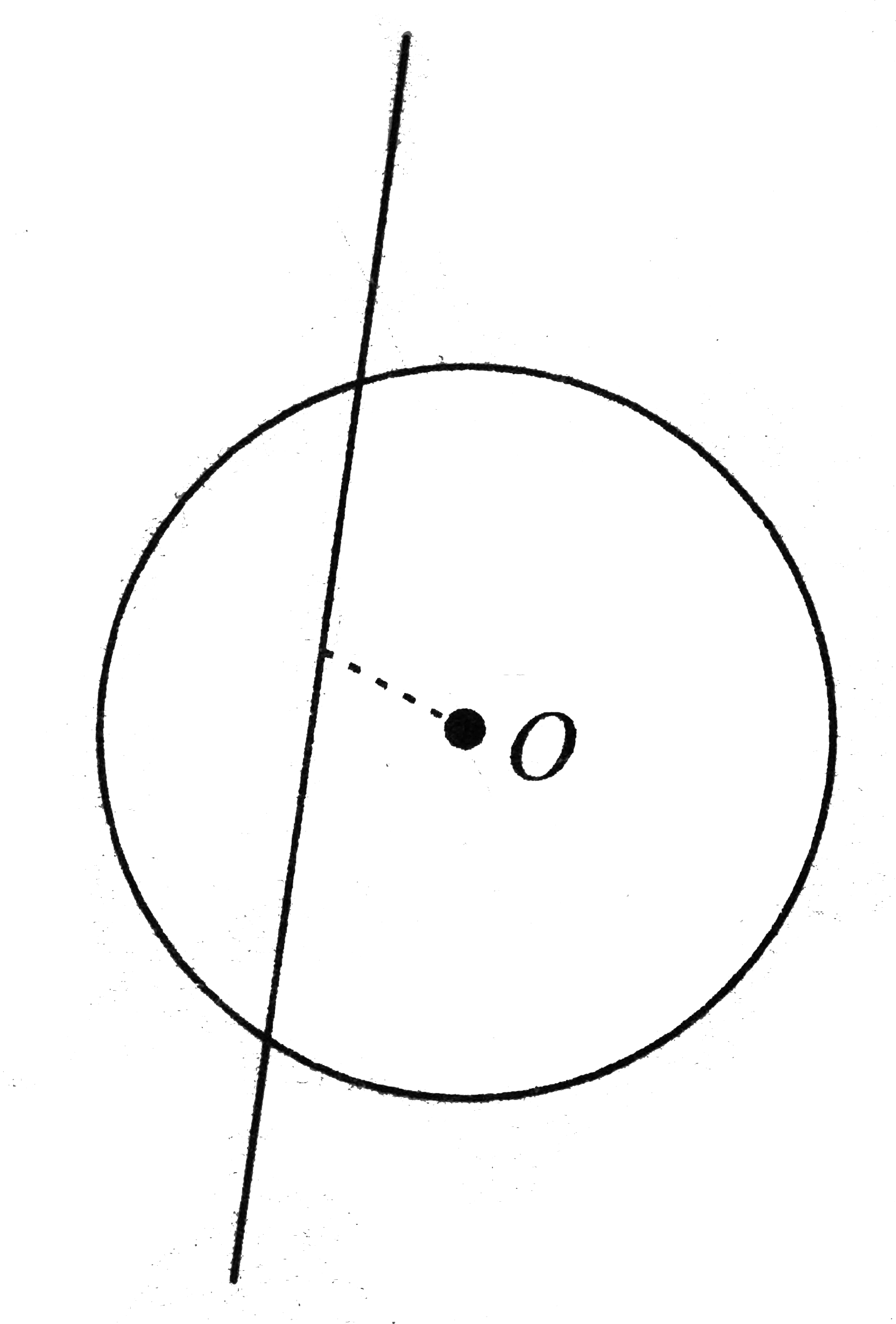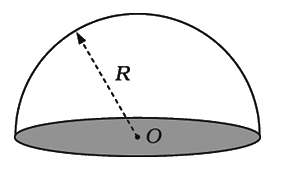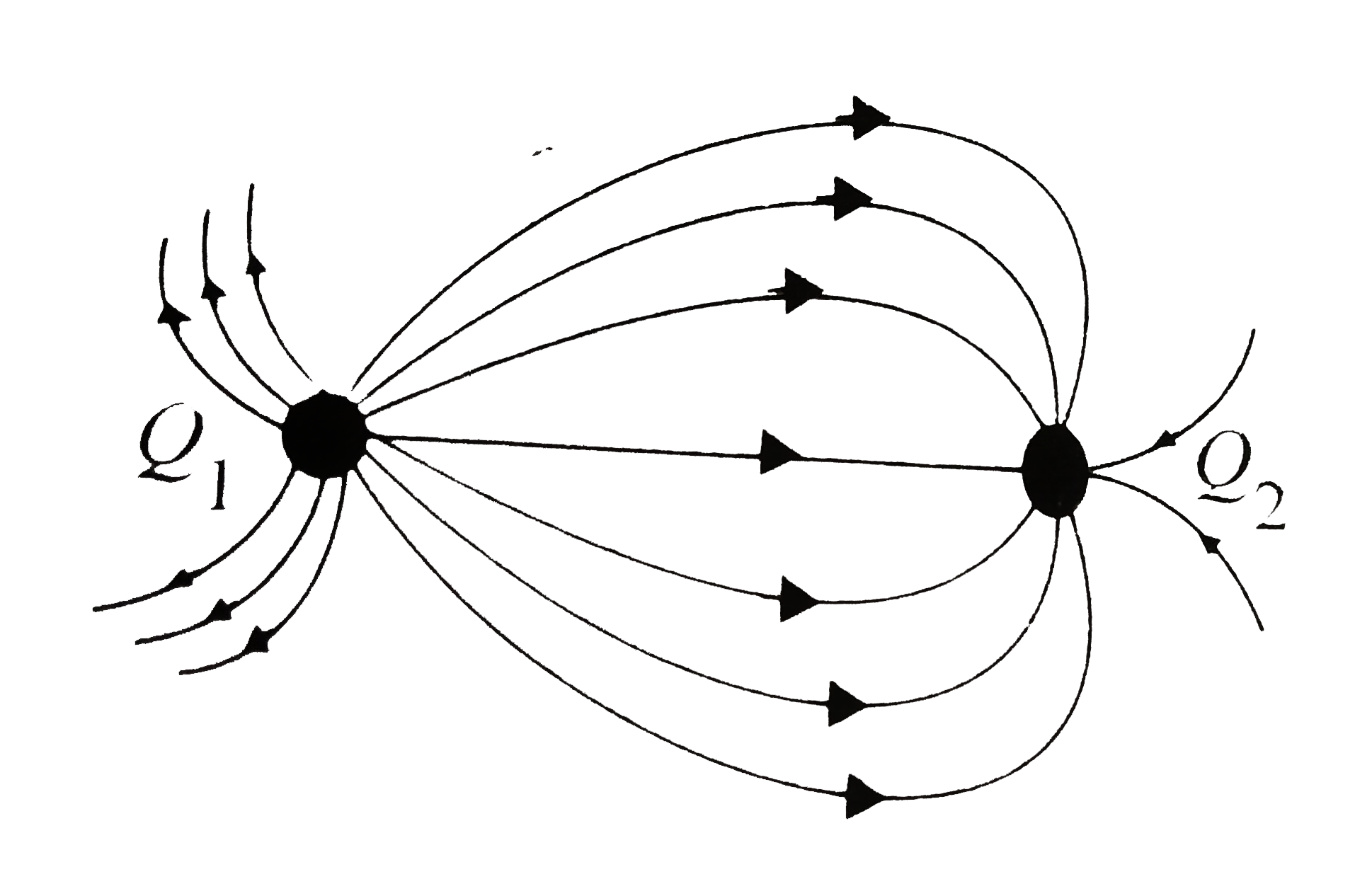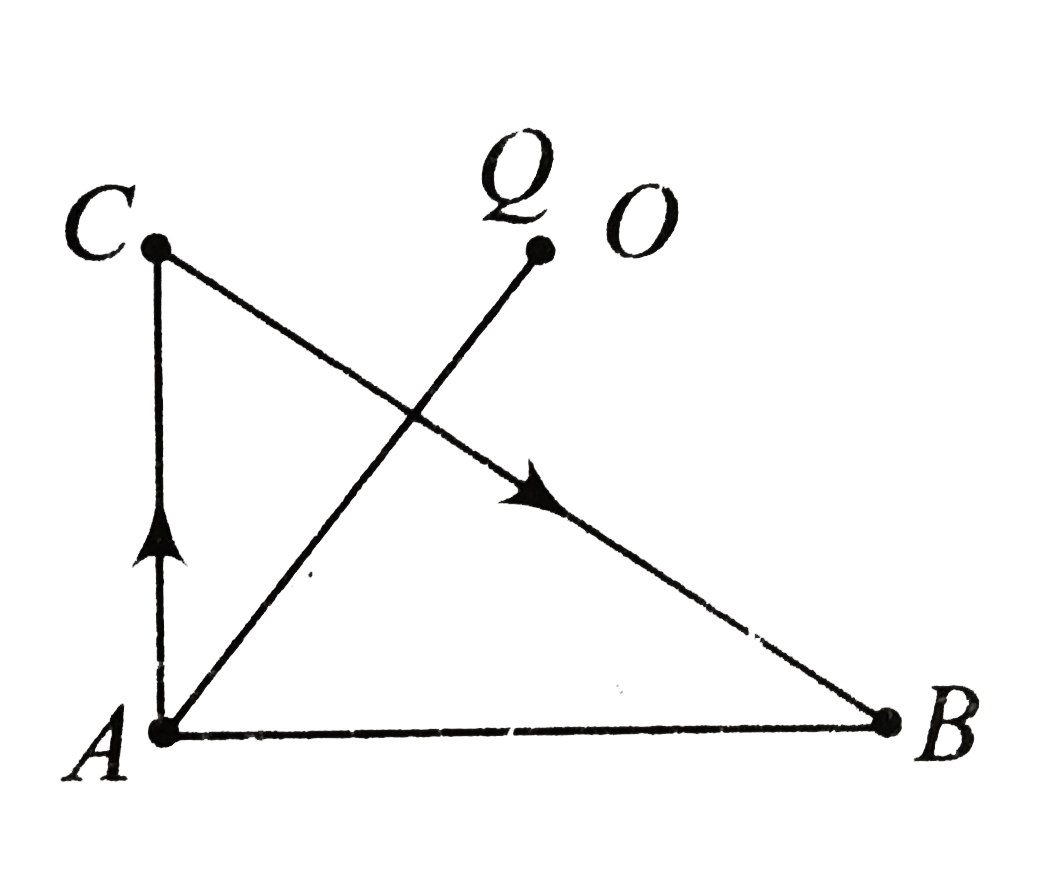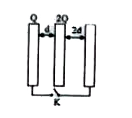ADDITIONAL PRACTICE EXERCISE (LEVEL - I (MAIN) (STRAIGHT OBJECTIVE TYPE QUESTIONS) from AAKASH SERIES ELECTROSTATICS for Class 12
| Class 12 | PHYSICS |
| Chapter | ELECTROSTATICS |
| AAKASH SERIES | ADDITIONAL PRACTICE EXERCISE (LEVEL - I (MAIN) (STRAIGHT OBJECTIVE TYPE QUESTIONS) |
| Medium | English |
| Academic Year | 2023-2024 |
Question 3
A non conducting ring of radius R has uniformly distributed positive chargeq. A small particle of mass m and charge −q is placed on the axis of the ring at point P and released If R>>x. The particle will undergo oscillations along the axis of symmerty with an angular frequency that is equal to
 View Solution
View SolutionQuestion 7
Two identical balls each having a density ρ are suspended from a common point by two insulating string of equal length. Both the balls have equal mass and charge. In equilibrium each string makes an angle θ with vertical. Now, both the balls are immersed in a liquid. As a result the angle θ does not change. The density of the liquid is σ. find the dielectric constant of the liquid.View SolutionQuestion 8
A horizontal electric field (E = (mg /q) exist in space, as shown in (Fig. 3.24.) A particle of mass m, having charge q, is attached at the end of a light insulated rod. If the particle is released from the position shown in the figure. Find the angular velocity of the rod when it passes through the bottom most position.
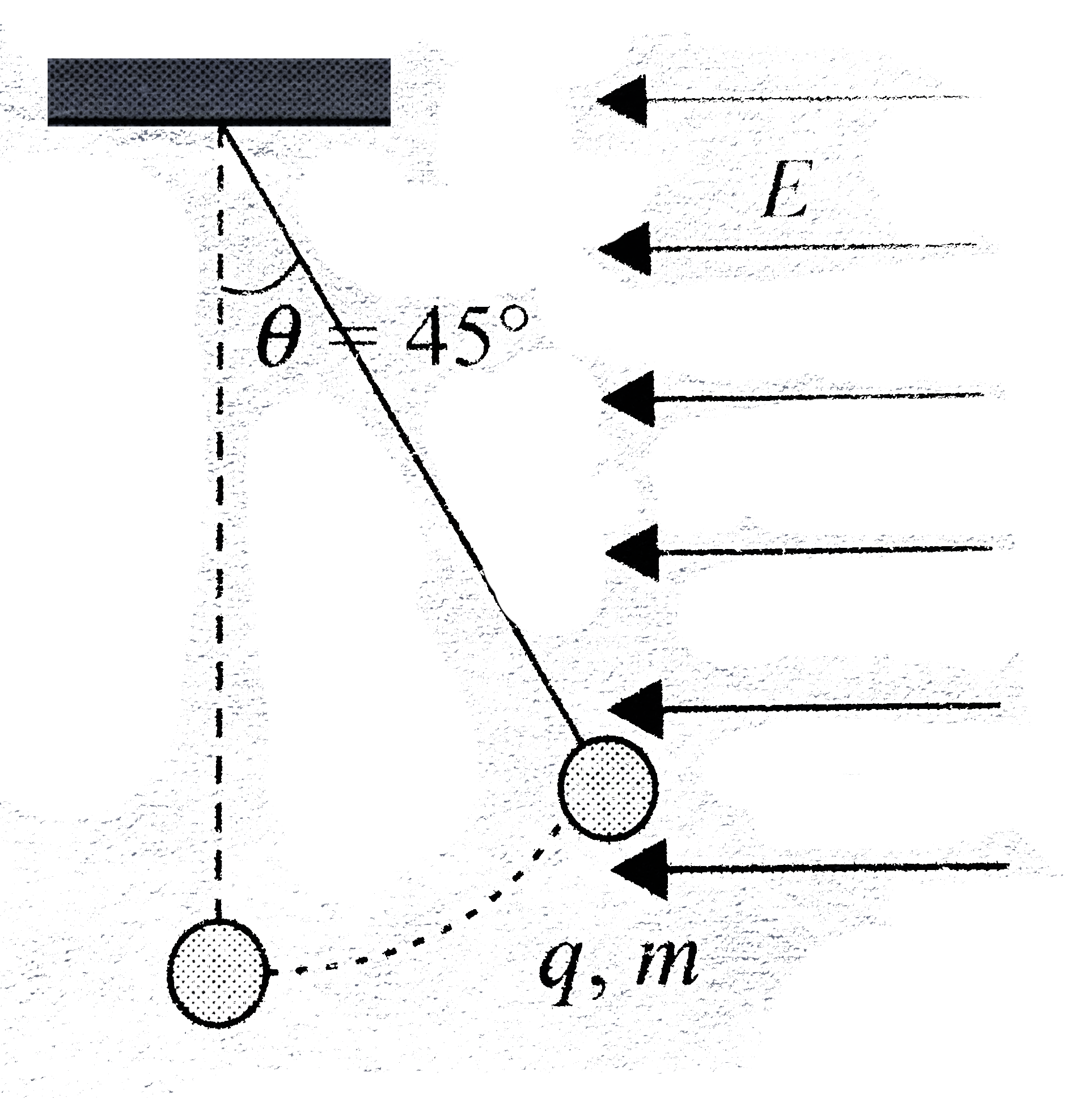 .View Solution
.View SolutionQuestion 9
Electric field given by the vector →E=xˆi+yˆj is present in the x y plane. A small ring carrying +Q, which can freely slide on a smooth nonconducting rod, is projected along the rod from the point (0,L) such that it can reach the other end of the rod. What minimum velocity should be given to the ring ? (Assume zero gravity).
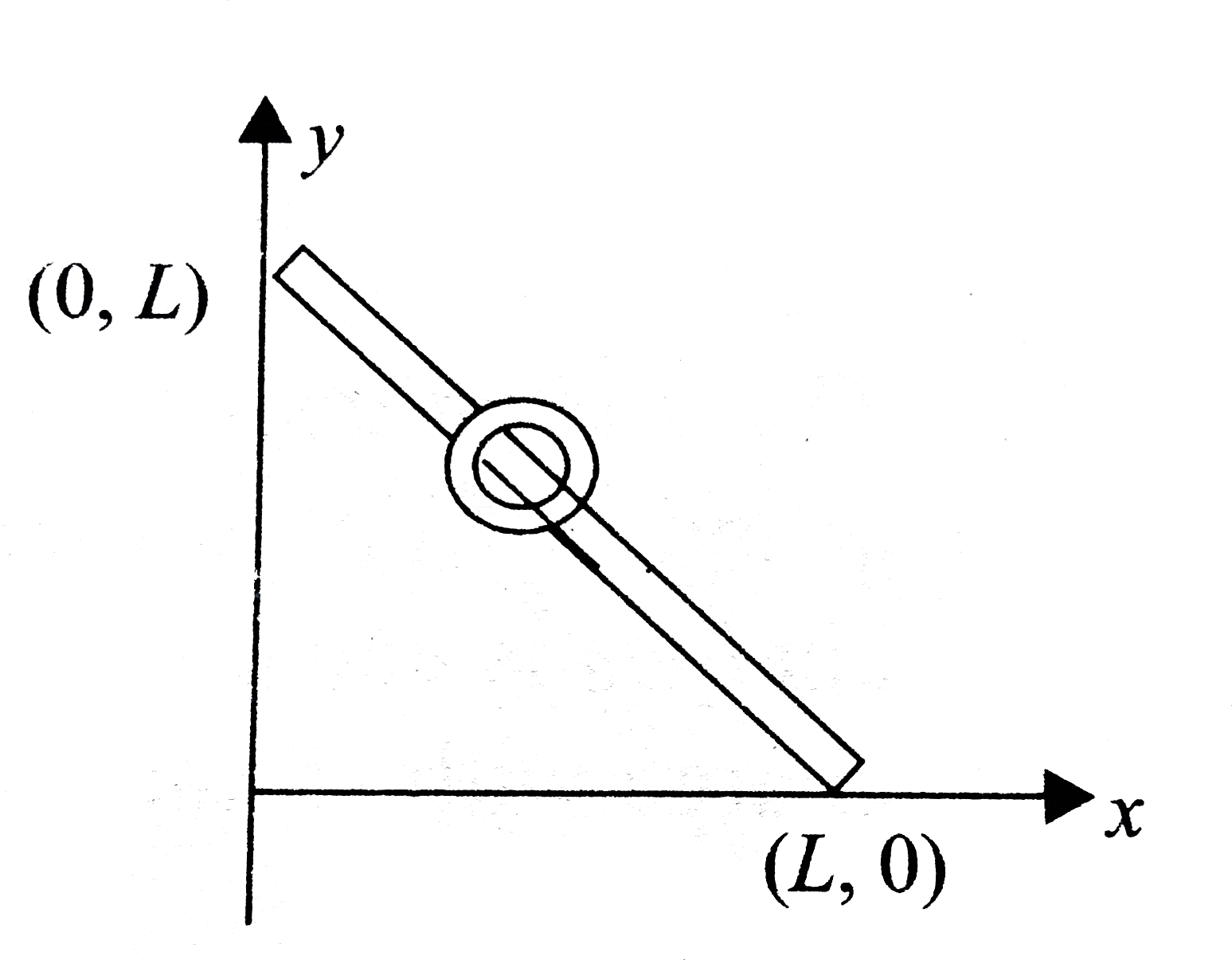 .View Solution
.View SolutionQuestion 10
A unit positive point charge of mass m is projected with a velocity V inside the tunnel as shown. The tunnel has been made inside a uniformly charged nonconducting sphere. The minimum velocity with which the point charge should be projected such that it can reach the opposite end of the tunnel is equal to
(##BMS_V03_C03_E01_124_Q01.png" width="80%">View SolutionQuestion 13
Four equal positive charge are fixed at the vertical of a square of side L. Z-axis is perpendicular to plane of the square. The point Z=0 is the point where the diagonals of the square intersect each other. The plot of electic field due to the charges, as one moves on the Z-axis isView SolutionQuestion 16
A ring of radius R is placed in the plane its centre at origin and its axis along the x-asis and having uniformly distributed positive charge. A ring of radius r(<<R) and coaxial with the larger ring is moving along the axis with constant velcity , then the variation of electrical flux (ϕ) passing through the smaller ring with position will be best represent by :
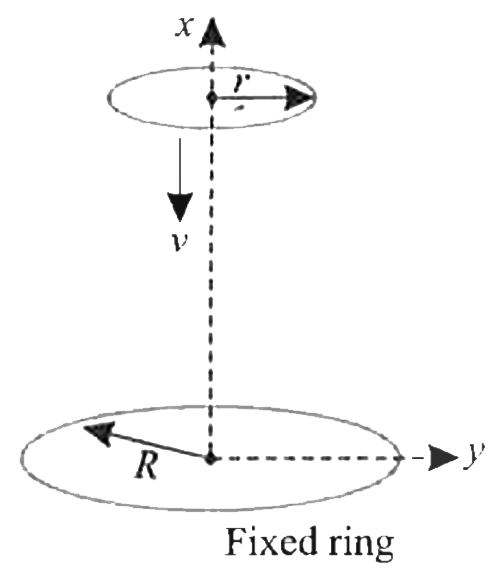 View Solution
View SolutionQuestion 18
Two identical point charges are placed separation of l. P is a point on the line joining charges, at a distance x from any one charge field at P is E. E is plotted against x for value from closeo to zero to slightly less than l. Which following best represents the resulting curve ?View SolutionQuestion 20
Two identical positive charges are fixed on the y-axis, at equal distances from the origin O. A particle with a negative charges starts on the x-axis at a large distance from O. moves along the x-axis passes through O, and moves far away from O on the other side. Its acceleration a is taken as positive along its direction of motion. Plot acceleration a of the particle against its x-coordinate. View SolutionQuestion 22
A system consits of a uniformly charged sphere of radius R and a surrounding medium filled by a charge with the volume density ρ=αr, where α is a positive constant and r is the distance from the centre of the sphere. Find the charge of the sphere for which the electric field intensity E outside the sphere is independent of R.View SolutionQuestion 33
A circular ring of radius R with uniform positive charge density λ per unit length is located in the y z plane with its center at the origin O. A particle of mass m and positive charge q is projected from that point p(−√3R,0,0) on the negative x - axis directly toward O, with initial speed V. Find the smallest (nonzero) value of the speed such that the particle does not return to P ?View SolutionQuestion 41
A thin wire of linear charge density λ is bent in the form of a triangle ABC and an imaginary cube of side .a. is taken with vertex A at the centre of the top face and vertices B,C at the opposite edge centres of the bottom face. The total electric flux linked with the cube is View SolutionQuestion 45
Two point charge Qa and Qb are positional at point A and B. The field strength to the right of charge Qb on the line that passes through the two charges varies according to a law represented schematically in fig. (without employing a definite scale). The field strength is assumed to be positive if its direction coincides with the positive direction of the x-axis. The distance between the charges is l=21cm.
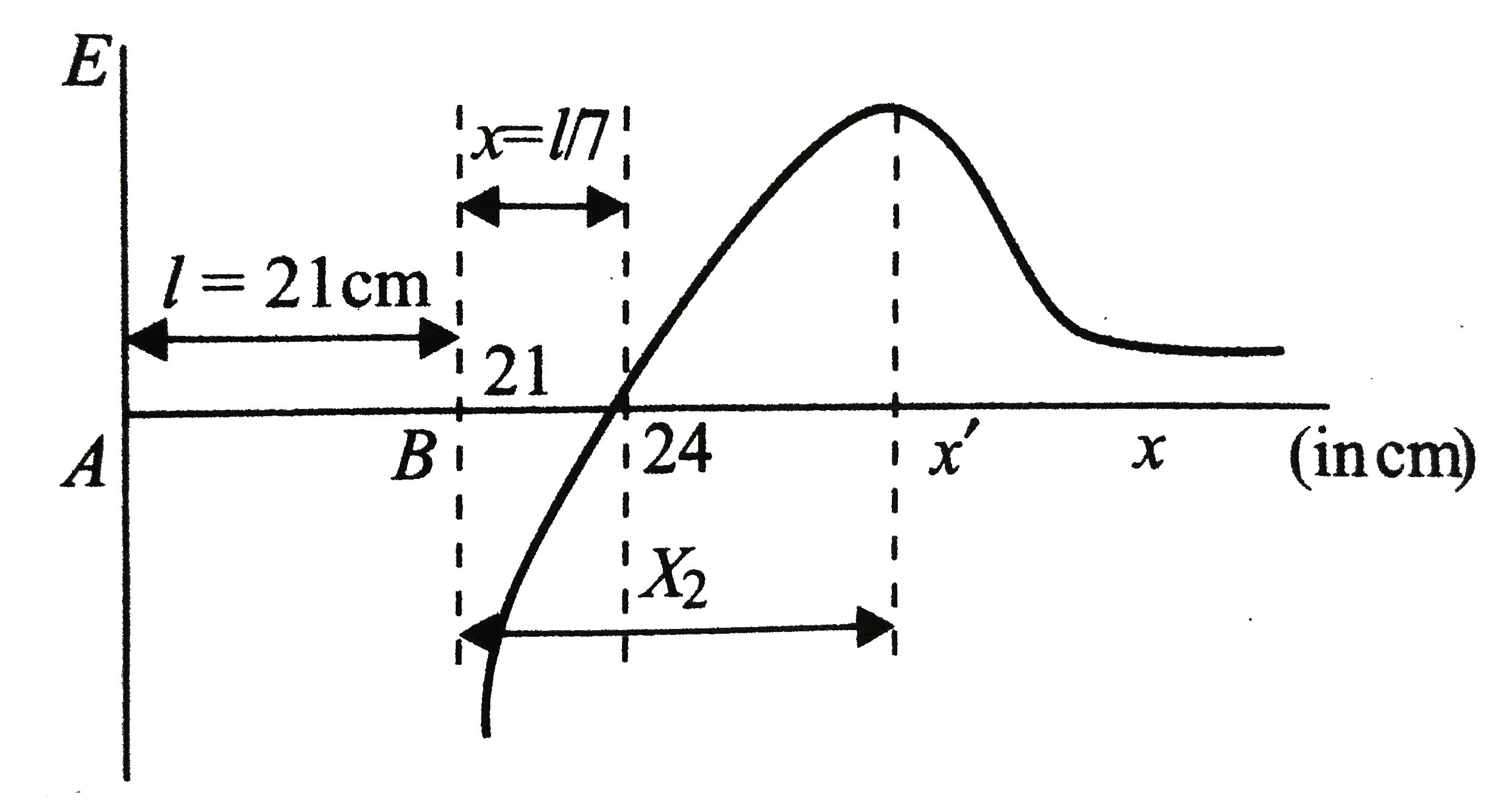
(a) Find the sign of the charges.
(b) Find the ratio between the absolute value of charge Qa and Qb.
(c ) Find the coordinate x of the point where the field strength is maximum. View SolutionQuestion 49
An empty thick conducting shell of inner radius a and outer radius b is shown in figure. If it is obseved that the inner face of the carries a uniform charge density −σ and the surface carries a uniform charge density .σ.

If a point charge qA is placed at the center of the shell, then choose the correct statement(s) View SolutionQuestion 50
An empty thick conducting shell of inner radius a and outer radius b is shown in figure. If it is obseved that the inner face of the carries a uniform charge density −σ and the surface carries a uniform charge density .σ.

If a point charge qA is placed at the center of the shell, then choose the correct statement(s) View SolutionQuestion 52
A clock face has charges −q,−2q,,.....−12q fixed at the position of the corresponding numerals on the dial. The clock hands do not disturb the net field due to point charges. At what time does the hour hand point in the direction of the electric field at the centre of the dial.View SolutionQuestion 53
Two particles having positive charges +Q and +2Q are fixed at equal distance x from centre of a conducting sphere having zero net charge and radius r as shown. Initially the switch S is open. After the switch S is closed, the net charge flowing out of sphere is (5−P)Qrx. find P
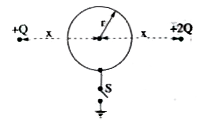 View Solution
View SolutionQuestion 62
Two point charges of +Q each have been placed at the positions (−a/2,0,0)and(a/2,0,0).The locus of the points where - Q charge can be placed such the that total electrostatic potential energy of the system can become equal to zero, is represented by which of the following equations ? View SolutionQuestion 70
Two metal sphers of masses m1andm2 are suspended from a common point by a light insulting strings of same length. The length of each string is same. The spheres are given positive charges q1andq2. Figure A shows angles made by the strings with vertical are different where as for figure B same. Then, which of the following is possible
 View Solution
View SolutionQuestion 71
A hollow insulating spherical shell has a surfac charge distribution placed upon it, such that the upper hemisphere has a uniform surface charge density σ. While the lower hemisphere has a uniform surface charge density −σ.as shown in the figure. Their interface lies in x-y plane which
 View Solution
View SolutionQuestion 74
A small conducting spherical shell with inner radius a and outer radius b is concentric with a larger conducting spherical shell with inner radius c and outer radius d. The inner shell has total charge +2q, and the outer shell has charge +4q. (K=(1)/(4piepsilon_(0)))

Find the electric in terms of q and the distance r from the common centre of the two shells for r>d. View SolutionQuestion 75
A small conducting spherical shell with inner radius a and outer radius b is concentric with a larger conducting spherical shell with inner radius c and outer radius d. The inner shell has total charge +2q, and the outer shell has charge +4q. (K=(1)/(4piepsilon_(0)))

Find the electric field in terms of q and the distance r from the common centre of the two shells for (i) b<r<c (ii) c<r<dView SolutionQuestion 76
A small conducting spherical shell with inner radius a and outer radius b is concentric with a larger conducting spherical shell with inner radius c and outer radius d. The inner shell has total charge +2q, and the outer shell has charge +4q. (K=(1)/(4piepsilon_(0)))

Find the electric in terms of q and the distance r from the common centre of the two shells for r>d. View SolutionQuestion 77
In Fig a conducting spherical shell of inner radius .x. and outer radius .y. is concentric with a larger conducting spherical shell of inner radius .a. and outer radius .b.. Inner shell has a total charge +3Q and the outer shell has a charge +5Q. Let r be the distance of any point from the common centre O.
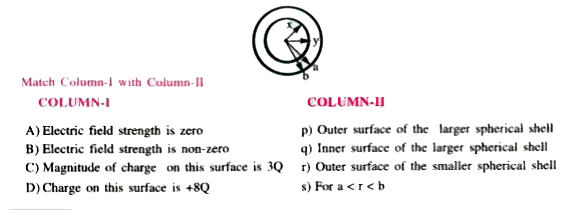 View Solution
View SolutionQuestion 79
Four identical positive point charges Q are fixed at the four corners of a square of side length l. Another charged particle of mass m and charge +q is projected towards centre of square from a large distance along the line perpendicular to plane of square. The minimum value of initial velocity v0 (in m/s) required to cross the square is ?
(m=1gm,l=4√2m,Q=1μc,q=0.5μc)
 View Solution
View Solution
All Exercises from AAKASH SERIES Class 12 PHYSICS ELECTROSTATICS
- LECTURE SHEET (EXERCISE - I) (LEVEL - I (MAIN ) STRAIGHT OBJECTIVE TYPE QUESTIONS)
- LECTURE SHEET (EXERCISE - I) (LEVEL - II (ADANCED) INTEGER TYPE QUESTIONS)
- LECTURE SHEET (EXERCISE - I) (LEVEL - II (ADVANCED ) MORE THAN ONE CORRECT ANSWER TYPE QUESTIONS)
- LECTURE SHEET (EXERCISE - I) (LEVEL - II (ADVANCED ) STRAIGHT OBJECTIVE TYPE QUESTIONS)
- LECTURE SHEET (EXERCISE - II) (LEVEL - I (MAIN ) STRAIGHT OBJECTIVE TYPE QUESTIONS)
- LECTURE SHEET (EXERCISE - II) (LEVEL - II (ADVANCED) INTEGER TYPE QUESTIONS)
- LECTURE SHEET (EXERCISE - II) (LEVEL - II (ADVANCED) MORE THAN ONE CORRECT ANSWER TYPE QUESTIONS)
- LECTURE SHEET (EXERCISE - II) (LEVEL - II (ADVANCED)LINKED COMP[REHENSION TYPE QUESTIONS)
- LECTURE SHEET (EXERCISE - III) (LEVEL - I (MAIN) STRAIGHT OBJECTIVE TYPE QUESTIONS)
- LECTURE SHEET (EXERCISE - III) (LEVEL - II (ADVANCED) INTEGER TYPE QUESTIONS)
- LECTURE SHEET (EXERCISE - III) (LEVEL - II (ADVANCED) LINKED COMPREHENSION TYPE QUESTIONS)
- LECTURE SHEET (EXERCISE - III) (LEVEL - II (ADVANCED) MATRIX MATCHING TYPE QUESTIONS)
- LECTURE SHEET (EXERCISE - III) (LEVEL - II (ADVANCED) MORE THAN ONE CORRECT ANSWER TYPE QUESTIONS)
- LECTURE SHEET (EXERCISE - III) (LEVEL - II (ADVANCED) STRAIGHT OBJECTIVE TYPE QUESTIONS)
- LECTURE SHEET (EXERCISE - IV) (LEVEL - I (MAIN) STRAIGHT OBJECTIVE TYPE QUESTIONS)
- LECTURE SHEET (EXERCISE - IV) (LEVEL - II (ADVANCED) INTEGER TYPE QUESTIONS)
- LECTURE SHEET (EXERCISE - IV) (LEVEL - II (ADVANCED) LINKED COMPREHENSION TYPE QUESTIONS)
- LECTURE SHEET (EXERCISE - IV) (LEVEL - II (ADVANCED) MATRIX MATCHING TYPE QUESTIONS)
- LECTURE SHEET (EXERCISE - IV) (LEVEL - II (ADVANCED) MORE THAN ONE CORRECT ANSWER TYPE QUESTIONS)
- LECTURE SHEET (EXERCISE - IV) (LEVEL - II (ADVANCED) STRAIGHT OBJECTIVE TYPE QUESTIONS)
- LECTURE SHEET (EXERCISE - V) (LEVEL - I (MAIN) STRAIGHT OBJECTIVE TYPE QUESTIONS)
- LECTURE SHEET (EXERCISE - V) (LEVEL - II (ADVANCED) INTEGER TYPE QUESTIONS)
- LECTURE SHEET (EXERCISE - V) (LEVEL - II (ADVANCED) LINKED COMPREHENSION TYPE QUESTIONS)
- LECTURE SHEET (EXERCISE - V) (LEVEL - II (ADVANCED) MATRIX MATCHING TYPE QUESTIONS)
- LECTURE SHEET (EXERCISE - V) (LEVEL - II (ADVANCED) MORE THAN ONE CORRECT ANSWER TYPE QUESTIONS)
- LECTURE SHEET (EXERCISE - I) (LEVEL - I (MAIN ) STRAIGHT OBJECTIVE TYPE QUESTIONS)
- LECTURE SHEET (EXERCISE - I) (LEVEL - II (ADANCED) INTEGER TYPE QUESTIONS)
- LECTURE SHEET (EXERCISE - I) (LEVEL - II (ADVANCED ) MORE THAN ONE CORRECT ANSWER TYPE QUESTIONS)
- LECTURE SHEET (EXERCISE - I) (LEVEL - II (ADVANCED ) STRAIGHT OBJECTIVE TYPE QUESTIONS)
- LECTURE SHEET (EXERCISE - II) (LEVEL - I (MAIN ) STRAIGHT OBJECTIVE TYPE QUESTIONS)
- LECTURE SHEET (EXERCISE - II) (LEVEL - II (ADVANCED) INTEGER TYPE QUESTIONS)
- LECTURE SHEET (EXERCISE - II) (LEVEL - II (ADVANCED) MORE THAN ONE CORRECT ANSWER TYPE QUESTIONS)
- LECTURE SHEET (EXERCISE - II) (LEVEL - II (ADVANCED)LINKED COMP[REHENSION TYPE QUESTIONS)
- LECTURE SHEET (EXERCISE - III) (LEVEL - I (MAIN) STRAIGHT OBJECTIVE TYPE QUESTIONS)
- LECTURE SHEET (EXERCISE - III) (LEVEL - II (ADVANCED) INTEGER TYPE QUESTIONS)
- LECTURE SHEET (EXERCISE - III) (LEVEL - II (ADVANCED) LINKED COMPREHENSION TYPE QUESTIONS)
- LECTURE SHEET (EXERCISE - III) (LEVEL - II (ADVANCED) MATRIX MATCHING TYPE QUESTIONS)
- LECTURE SHEET (EXERCISE - III) (LEVEL - II (ADVANCED) MORE THAN ONE CORRECT ANSWER TYPE QUESTIONS)
- LECTURE SHEET (EXERCISE - III) (LEVEL - II (ADVANCED) STRAIGHT OBJECTIVE TYPE QUESTIONS)
- LECTURE SHEET (EXERCISE - IV) (LEVEL - I (MAIN) STRAIGHT OBJECTIVE TYPE QUESTIONS)
- LECTURE SHEET (EXERCISE - IV) (LEVEL - II (ADVANCED) INTEGER TYPE QUESTIONS)
- LECTURE SHEET (EXERCISE - IV) (LEVEL - II (ADVANCED) LINKED COMPREHENSION TYPE QUESTIONS)
- LECTURE SHEET (EXERCISE - IV) (LEVEL - II (ADVANCED) MATRIX MATCHING TYPE QUESTIONS)
- LECTURE SHEET (EXERCISE - IV) (LEVEL - II (ADVANCED) MORE THAN ONE CORRECT ANSWER TYPE QUESTIONS)
- LECTURE SHEET (EXERCISE - IV) (LEVEL - II (ADVANCED) STRAIGHT OBJECTIVE TYPE QUESTIONS)
- LECTURE SHEET (EXERCISE - V) (LEVEL - I (MAIN) STRAIGHT OBJECTIVE TYPE QUESTIONS)
- LECTURE SHEET (EXERCISE - V) (LEVEL - II (ADVANCED) INTEGER TYPE QUESTIONS)
- LECTURE SHEET (EXERCISE - V) (LEVEL - II (ADVANCED) LINKED COMPREHENSION TYPE QUESTIONS)
- LECTURE SHEET (EXERCISE - V) (LEVEL - II (ADVANCED) MATRIX MATCHING TYPE QUESTIONS)
- LECTURE SHEET (EXERCISE - V) (LEVEL - II (ADVANCED) MORE THAN ONE CORRECT ANSWER TYPE QUESTIONS)
- LECTURE SHEET (EXERCISE - I) (LEVEL - I (MAIN ) STRAIGHT OBJECTIVE TYPE QUESTIONS)
- LECTURE SHEET (EXERCISE - I) (LEVEL - II (ADANCED) INTEGER TYPE QUESTIONS)
- LECTURE SHEET (EXERCISE - I) (LEVEL - II (ADVANCED ) MORE THAN ONE CORRECT ANSWER TYPE QUESTIONS)
- LECTURE SHEET (EXERCISE - I) (LEVEL - II (ADVANCED ) STRAIGHT OBJECTIVE TYPE QUESTIONS)
- LECTURE SHEET (EXERCISE - II) (LEVEL - I (MAIN ) STRAIGHT OBJECTIVE TYPE QUESTIONS)
- LECTURE SHEET (EXERCISE - II) (LEVEL - II (ADVANCED) INTEGER TYPE QUESTIONS)
- LECTURE SHEET (EXERCISE - II) (LEVEL - II (ADVANCED) MORE THAN ONE CORRECT ANSWER TYPE QUESTIONS)
- LECTURE SHEET (EXERCISE - II) (LEVEL - II (ADVANCED)LINKED COMP[REHENSION TYPE QUESTIONS)
- LECTURE SHEET (EXERCISE - III) (LEVEL - I (MAIN) STRAIGHT OBJECTIVE TYPE QUESTIONS)
- LECTURE SHEET (EXERCISE - III) (LEVEL - II (ADVANCED) INTEGER TYPE QUESTIONS)
- LECTURE SHEET (EXERCISE - III) (LEVEL - II (ADVANCED) LINKED COMPREHENSION TYPE QUESTIONS)
- LECTURE SHEET (EXERCISE - III) (LEVEL - II (ADVANCED) MATRIX MATCHING TYPE QUESTIONS)
- LECTURE SHEET (EXERCISE - III) (LEVEL - II (ADVANCED) MORE THAN ONE CORRECT ANSWER TYPE QUESTIONS)
- LECTURE SHEET (EXERCISE - III) (LEVEL - II (ADVANCED) STRAIGHT OBJECTIVE TYPE QUESTIONS)
- LECTURE SHEET (EXERCISE - IV) (LEVEL - I (MAIN) STRAIGHT OBJECTIVE TYPE QUESTIONS)
- LECTURE SHEET (EXERCISE - IV) (LEVEL - II (ADVANCED) INTEGER TYPE QUESTIONS)
- LECTURE SHEET (EXERCISE - IV) (LEVEL - II (ADVANCED) LINKED COMPREHENSION TYPE QUESTIONS)
- LECTURE SHEET (EXERCISE - IV) (LEVEL - II (ADVANCED) MATRIX MATCHING TYPE QUESTIONS)
- LECTURE SHEET (EXERCISE - IV) (LEVEL - II (ADVANCED) MORE THAN ONE CORRECT ANSWER TYPE QUESTIONS)
- LECTURE SHEET (EXERCISE - IV) (LEVEL - II (ADVANCED) STRAIGHT OBJECTIVE TYPE QUESTIONS)
- LECTURE SHEET (EXERCISE - V) (LEVEL - I (MAIN) STRAIGHT OBJECTIVE TYPE QUESTIONS)
- LECTURE SHEET (EXERCISE - V) (LEVEL - II (ADVANCED) INTEGER TYPE QUESTIONS)
- LECTURE SHEET (EXERCISE - V) (LEVEL - II (ADVANCED) LINKED COMPREHENSION TYPE QUESTIONS)
- LECTURE SHEET (EXERCISE - V) (LEVEL - II (ADVANCED) MATRIX MATCHING TYPE QUESTIONS)
- LECTURE SHEET (EXERCISE - V) (LEVEL - II (ADVANCED) MORE THAN ONE CORRECT ANSWER TYPE QUESTIONS)
- LECTURE SHEET (EXERCISE - I) (LEVEL - I (MAIN ) STRAIGHT OBJECTIVE TYPE QUESTIONS)
- LECTURE SHEET (EXERCISE - I) (LEVEL - II (ADANCED) INTEGER TYPE QUESTIONS)
- LECTURE SHEET (EXERCISE - I) (LEVEL - II (ADVANCED ) MORE THAN ONE CORRECT ANSWER TYPE QUESTIONS)
- LECTURE SHEET (EXERCISE - I) (LEVEL - II (ADVANCED ) STRAIGHT OBJECTIVE TYPE QUESTIONS)
- LECTURE SHEET (EXERCISE - II) (LEVEL - I (MAIN ) STRAIGHT OBJECTIVE TYPE QUESTIONS)
- LECTURE SHEET (EXERCISE - II) (LEVEL - II (ADVANCED) INTEGER TYPE QUESTIONS)
- LECTURE SHEET (EXERCISE - II) (LEVEL - II (ADVANCED) MORE THAN ONE CORRECT ANSWER TYPE QUESTIONS)
- LECTURE SHEET (EXERCISE - II) (LEVEL - II (ADVANCED)LINKED COMP[REHENSION TYPE QUESTIONS)
- LECTURE SHEET (EXERCISE - III) (LEVEL - I (MAIN) STRAIGHT OBJECTIVE TYPE QUESTIONS)
- LECTURE SHEET (EXERCISE - III) (LEVEL - II (ADVANCED) INTEGER TYPE QUESTIONS)
- LECTURE SHEET (EXERCISE - III) (LEVEL - II (ADVANCED) LINKED COMPREHENSION TYPE QUESTIONS)
- LECTURE SHEET (EXERCISE - III) (LEVEL - II (ADVANCED) MATRIX MATCHING TYPE QUESTIONS)
- LECTURE SHEET (EXERCISE - III) (LEVEL - II (ADVANCED) MORE THAN ONE CORRECT ANSWER TYPE QUESTIONS)
- LECTURE SHEET (EXERCISE - III) (LEVEL - II (ADVANCED) STRAIGHT OBJECTIVE TYPE QUESTIONS)
- LECTURE SHEET (EXERCISE - IV) (LEVEL - I (MAIN) STRAIGHT OBJECTIVE TYPE QUESTIONS)
- LECTURE SHEET (EXERCISE - IV) (LEVEL - II (ADVANCED) INTEGER TYPE QUESTIONS)
- LECTURE SHEET (EXERCISE - IV) (LEVEL - II (ADVANCED) LINKED COMPREHENSION TYPE QUESTIONS)
- LECTURE SHEET (EXERCISE - IV) (LEVEL - II (ADVANCED) MATRIX MATCHING TYPE QUESTIONS)
- LECTURE SHEET (EXERCISE - IV) (LEVEL - II (ADVANCED) MORE THAN ONE CORRECT ANSWER TYPE QUESTIONS)
- LECTURE SHEET (EXERCISE - IV) (LEVEL - II (ADVANCED) STRAIGHT OBJECTIVE TYPE QUESTIONS)
- LECTURE SHEET (EXERCISE - V) (LEVEL - I (MAIN) STRAIGHT OBJECTIVE TYPE QUESTIONS)
- LECTURE SHEET (EXERCISE - V) (LEVEL - II (ADVANCED) INTEGER TYPE QUESTIONS)
- LECTURE SHEET (EXERCISE - V) (LEVEL - II (ADVANCED) LINKED COMPREHENSION TYPE QUESTIONS)
- LECTURE SHEET (EXERCISE - V) (LEVEL - II (ADVANCED) MATRIX MATCHING TYPE QUESTIONS)
- LECTURE SHEET (EXERCISE - V) (LEVEL - II (ADVANCED) MORE THAN ONE CORRECT ANSWER TYPE QUESTIONS)
- PRACTICE SHEET (EXERCISE - I COULOMB.S INVERSE SQUARE LAQW) (LEVEL - II (ADVANCED LINKED COMPREHENSION TYPE QUESTION)
- PRACTICE SHEET (EXERCISE - I COULOMB.S INVERSE SQUARE LAQW) (LEVEL - II (ADVANCED) MORE THAN ONE CORRECT ANSWER TYPE QUESTION)
- PRACTICE SHEET (EXERCISE - I COULOMB.S INVERSE SQUARE LAQW) (LEVEL -I (MAIN) STRAIGHT OBJECTIVE TYPE QUESTION
- PRACTICE SHEET (EXERCISE - II INTENSITY OF ELECTRIC FIELD) (LEVEL - I (MAIN) STRAIGHT OBJECTIVE TYPE QUESTION)
- PRACTICE SHEET (EXERCISE - II INTENSITY OF ELECTRIC FIELD) (LEVEL - II (MAIN) LINKED COMPREHINSION TYPE QUESTION)
- PRACTICE SHEET (EXERCISE - II INTENSITY OF ELECTRIC FIELD) (LEVEL - II (MAIN) MATRIX MATCHING TYPE QUESTIONS)
- PRACTICE SHEET (EXERCISE - II INTENSITY OF ELECTRIC FIELD) (LEVEL - II (MAIN) MORE THAN ONE ANSWER TYPE QUESTION)
- PRACTICE SHEET (EXERCISE - II INTENSITY OF ELECTRIC FIELD) (LEVEL - II (MAIN) MORE THAN ONE CORRECT ANSWER TYPE QUESTIONS
- PRACTICE SHEET (EXERCISE - II INTENSITY OF ELECTRIC FIELD) (LEVEL - II (MAIN) STRAIGHT OBJECTIVE TYPE QUESTION)
- PRACTICE SHEET (EXERCISE -III ELECTRO FLUX & GAUSS.S LAW) (LEVEL - I (ADVANCED) LINKED COMPREHENSION TYPE QUESTIONS)
- PRACTICE SHEET (EXERCISE -III ELECTRO FLUX & GAUSS.S LAW) (LEVEL - I (ADVANCED) MATRIX MATCHING TYPE QUESTIONS
- PRACTICE SHEET (EXERCISE -III ELECTRO FLUX & GAUSS.S LAW) (LEVEL - I (ADVANCED) MORE THAN ONE CORRECT ANWER TYPE QUESTIONS
- PRACTICE SHEET (EXERCISE -III ELECTRO FLUX & GAUSS.S LAW) (LEVEL - I (ADVANCED) STRAIGHT OBJECTIVE TYPE QUESTION)
- PRACTICE SHEET (EXERCISE -III ELECTRO FLUX & GAUSS.S LAW) (LEVEL - I (MAIN) INTEGER TYPE QUESTIONS
- PRACTICE SHEET (EXERCISE -III ELECTRO FLUX & GAUSS.S LAW) (LEVEL - I (MAIN) STRAIGHT OBJECTIVE TYPE QUESTIONS)
- PRACTICE SHEET (EXERCISE -IV ELECTRIC POTENTIAL & POTENTIAL ENERGY) (LEVEL - I (MAIN) STRAIGHT OBJECTIVE TYPE QUESTION)
- PRACTICE SHEET (EXERCISE -IV ELECTRIC POTENTIAL & POTENTIAL ENERGY) (LEVEL - II (ADVANCED) INTEGER TYPE QUESTIONS)
- PRACTICE SHEET (EXERCISE -IV ELECTRIC POTENTIAL & POTENTIAL ENERGY) (LEVEL - II (ADVANCED) LINKED COMPREHENSION TYPE QUESTION)
- PRACTICE SHEET (EXERCISE -IV ELECTRIC POTENTIAL & POTENTIAL ENERGY) (LEVEL - II (ADVANCED) MATRIX MATCHING TYPE QUESTIONS)
- PRACTICE SHEET (EXERCISE -IV ELECTRIC POTENTIAL & POTENTIAL ENERGY) (LEVEL - II (ADVANCED) MORE THAN ONE CORRECT ANSWER TYPE QUESTION)
- PRACTICE SHEET (EXERCISE -IV ELECTRIC POTENTIAL & POTENTIAL ENERGY) (LEVEL - II (ADVANCED) STRAIGHT OBJECTIVE TYPE QUESTION)
- PRACTICE SHEET (EXERCISE -V ELECTRIC DIPOLE) (LEVEL - I (MAIN) STRAIGHT OBJECTIVE TYPE QUESTIONS)
- PRACTICE SHEET (EXERCISE -V ELECTRIC DIPOLE) (LEVEL -II INTEGER TYPE QUESTION)
- PRACTICE SHEET (EXERCISE -V ELECTRIC DIPOLE) (LEVEL -II LINKED COMPREHENSION TYPE QUESTION)
- PRACTICE SHEET (EXERCISE -V ELECTRIC DIPOLE) (LEVEL -II STRAIGHT OBJECTIVE TYPE QUESTION)
- PRACTICE SHEET (EXERCISE - I COULOMB.S INVERSE SQUARE LAQW) (LEVEL - II (ADVANCED LINKED COMPREHENSION TYPE QUESTION)
- PRACTICE SHEET (EXERCISE - I COULOMB.S INVERSE SQUARE LAQW) (LEVEL - II (ADVANCED) MORE THAN ONE CORRECT ANSWER TYPE QUESTION)
- PRACTICE SHEET (EXERCISE - I COULOMB.S INVERSE SQUARE LAQW) (LEVEL -I (MAIN) STRAIGHT OBJECTIVE TYPE QUESTION
- PRACTICE SHEET (EXERCISE - II INTENSITY OF ELECTRIC FIELD) (LEVEL - I (MAIN) STRAIGHT OBJECTIVE TYPE QUESTION)
- PRACTICE SHEET (EXERCISE - II INTENSITY OF ELECTRIC FIELD) (LEVEL - II (MAIN) LINKED COMPREHINSION TYPE QUESTION)
- PRACTICE SHEET (EXERCISE - II INTENSITY OF ELECTRIC FIELD) (LEVEL - II (MAIN) MATRIX MATCHING TYPE QUESTIONS)
- PRACTICE SHEET (EXERCISE - II INTENSITY OF ELECTRIC FIELD) (LEVEL - II (MAIN) MORE THAN ONE ANSWER TYPE QUESTION)
- PRACTICE SHEET (EXERCISE - II INTENSITY OF ELECTRIC FIELD) (LEVEL - II (MAIN) MORE THAN ONE CORRECT ANSWER TYPE QUESTIONS
- PRACTICE SHEET (EXERCISE - II INTENSITY OF ELECTRIC FIELD) (LEVEL - II (MAIN) STRAIGHT OBJECTIVE TYPE QUESTION)
- PRACTICE SHEET (EXERCISE -III ELECTRO FLUX & GAUSS.S LAW) (LEVEL - I (ADVANCED) LINKED COMPREHENSION TYPE QUESTIONS)
- PRACTICE SHEET (EXERCISE -III ELECTRO FLUX & GAUSS.S LAW) (LEVEL - I (ADVANCED) MATRIX MATCHING TYPE QUESTIONS
- PRACTICE SHEET (EXERCISE -III ELECTRO FLUX & GAUSS.S LAW) (LEVEL - I (ADVANCED) MORE THAN ONE CORRECT ANWER TYPE QUESTIONS
- PRACTICE SHEET (EXERCISE -III ELECTRO FLUX & GAUSS.S LAW) (LEVEL - I (ADVANCED) STRAIGHT OBJECTIVE TYPE QUESTION)
- PRACTICE SHEET (EXERCISE -III ELECTRO FLUX & GAUSS.S LAW) (LEVEL - I (MAIN) INTEGER TYPE QUESTIONS
- PRACTICE SHEET (EXERCISE -III ELECTRO FLUX & GAUSS.S LAW) (LEVEL - I (MAIN) STRAIGHT OBJECTIVE TYPE QUESTIONS)
- PRACTICE SHEET (EXERCISE -IV ELECTRIC POTENTIAL & POTENTIAL ENERGY) (LEVEL - I (MAIN) STRAIGHT OBJECTIVE TYPE QUESTION)
- PRACTICE SHEET (EXERCISE -IV ELECTRIC POTENTIAL & POTENTIAL ENERGY) (LEVEL - II (ADVANCED) INTEGER TYPE QUESTIONS)
- PRACTICE SHEET (EXERCISE -IV ELECTRIC POTENTIAL & POTENTIAL ENERGY) (LEVEL - II (ADVANCED) LINKED COMPREHENSION TYPE QUESTION)
- PRACTICE SHEET (EXERCISE -IV ELECTRIC POTENTIAL & POTENTIAL ENERGY) (LEVEL - II (ADVANCED) MATRIX MATCHING TYPE QUESTIONS)
- PRACTICE SHEET (EXERCISE -IV ELECTRIC POTENTIAL & POTENTIAL ENERGY) (LEVEL - II (ADVANCED) MORE THAN ONE CORRECT ANSWER TYPE QUESTION)
- PRACTICE SHEET (EXERCISE -IV ELECTRIC POTENTIAL & POTENTIAL ENERGY) (LEVEL - II (ADVANCED) STRAIGHT OBJECTIVE TYPE QUESTION)
- PRACTICE SHEET (EXERCISE -V ELECTRIC DIPOLE) (LEVEL - I (MAIN) STRAIGHT OBJECTIVE TYPE QUESTIONS)
- PRACTICE SHEET (EXERCISE -V ELECTRIC DIPOLE) (LEVEL -II INTEGER TYPE QUESTION)
- PRACTICE SHEET (EXERCISE -V ELECTRIC DIPOLE) (LEVEL -II LINKED COMPREHENSION TYPE QUESTION)
- PRACTICE SHEET (EXERCISE -V ELECTRIC DIPOLE) (LEVEL -II STRAIGHT OBJECTIVE TYPE QUESTION)
- PRACTICE SHEET (EXERCISE - I COULOMB.S INVERSE SQUARE LAQW) (LEVEL - II (ADVANCED LINKED COMPREHENSION TYPE QUESTION)
- PRACTICE SHEET (EXERCISE - I COULOMB.S INVERSE SQUARE LAQW) (LEVEL - II (ADVANCED) MORE THAN ONE CORRECT ANSWER TYPE QUESTION)
- PRACTICE SHEET (EXERCISE - I COULOMB.S INVERSE SQUARE LAQW) (LEVEL -I (MAIN) STRAIGHT OBJECTIVE TYPE QUESTION
- PRACTICE SHEET (EXERCISE - II INTENSITY OF ELECTRIC FIELD) (LEVEL - I (MAIN) STRAIGHT OBJECTIVE TYPE QUESTION)
- PRACTICE SHEET (EXERCISE - II INTENSITY OF ELECTRIC FIELD) (LEVEL - II (MAIN) LINKED COMPREHINSION TYPE QUESTION)
- PRACTICE SHEET (EXERCISE - II INTENSITY OF ELECTRIC FIELD) (LEVEL - II (MAIN) MATRIX MATCHING TYPE QUESTIONS)
- PRACTICE SHEET (EXERCISE - II INTENSITY OF ELECTRIC FIELD) (LEVEL - II (MAIN) MORE THAN ONE ANSWER TYPE QUESTION)
- PRACTICE SHEET (EXERCISE - II INTENSITY OF ELECTRIC FIELD) (LEVEL - II (MAIN) MORE THAN ONE CORRECT ANSWER TYPE QUESTIONS
- PRACTICE SHEET (EXERCISE - II INTENSITY OF ELECTRIC FIELD) (LEVEL - II (MAIN) STRAIGHT OBJECTIVE TYPE QUESTION)
- PRACTICE SHEET (EXERCISE -III ELECTRO FLUX & GAUSS.S LAW) (LEVEL - I (ADVANCED) LINKED COMPREHENSION TYPE QUESTIONS)
- PRACTICE SHEET (EXERCISE -III ELECTRO FLUX & GAUSS.S LAW) (LEVEL - I (ADVANCED) MATRIX MATCHING TYPE QUESTIONS
- PRACTICE SHEET (EXERCISE -III ELECTRO FLUX & GAUSS.S LAW) (LEVEL - I (ADVANCED) MORE THAN ONE CORRECT ANWER TYPE QUESTIONS
- PRACTICE SHEET (EXERCISE -III ELECTRO FLUX & GAUSS.S LAW) (LEVEL - I (ADVANCED) STRAIGHT OBJECTIVE TYPE QUESTION)
- PRACTICE SHEET (EXERCISE -III ELECTRO FLUX & GAUSS.S LAW) (LEVEL - I (MAIN) INTEGER TYPE QUESTIONS
- PRACTICE SHEET (EXERCISE -III ELECTRO FLUX & GAUSS.S LAW) (LEVEL - I (MAIN) STRAIGHT OBJECTIVE TYPE QUESTIONS)
- PRACTICE SHEET (EXERCISE -IV ELECTRIC POTENTIAL & POTENTIAL ENERGY) (LEVEL - I (MAIN) STRAIGHT OBJECTIVE TYPE QUESTION)
- PRACTICE SHEET (EXERCISE -IV ELECTRIC POTENTIAL & POTENTIAL ENERGY) (LEVEL - II (ADVANCED) INTEGER TYPE QUESTIONS)
- PRACTICE SHEET (EXERCISE -IV ELECTRIC POTENTIAL & POTENTIAL ENERGY) (LEVEL - II (ADVANCED) LINKED COMPREHENSION TYPE QUESTION)
- PRACTICE SHEET (EXERCISE -IV ELECTRIC POTENTIAL & POTENTIAL ENERGY) (LEVEL - II (ADVANCED) MATRIX MATCHING TYPE QUESTIONS)
- PRACTICE SHEET (EXERCISE -IV ELECTRIC POTENTIAL & POTENTIAL ENERGY) (LEVEL - II (ADVANCED) MORE THAN ONE CORRECT ANSWER TYPE QUESTION)
- PRACTICE SHEET (EXERCISE -IV ELECTRIC POTENTIAL & POTENTIAL ENERGY) (LEVEL - II (ADVANCED) STRAIGHT OBJECTIVE TYPE QUESTION)
- PRACTICE SHEET (EXERCISE -V ELECTRIC DIPOLE) (LEVEL - I (MAIN) STRAIGHT OBJECTIVE TYPE QUESTIONS)
- PRACTICE SHEET (EXERCISE -V ELECTRIC DIPOLE) (LEVEL -II INTEGER TYPE QUESTION)
- PRACTICE SHEET (EXERCISE -V ELECTRIC DIPOLE) (LEVEL -II LINKED COMPREHENSION TYPE QUESTION)
- PRACTICE SHEET (EXERCISE -V ELECTRIC DIPOLE) (LEVEL -II STRAIGHT OBJECTIVE TYPE QUESTION)
- PRACTICE SHEET (EXERCISE - I COULOMB.S INVERSE SQUARE LAQW) (LEVEL - II (ADVANCED LINKED COMPREHENSION TYPE QUESTION)
- PRACTICE SHEET (EXERCISE - I COULOMB.S INVERSE SQUARE LAQW) (LEVEL - II (ADVANCED) MORE THAN ONE CORRECT ANSWER TYPE QUESTION)
- PRACTICE SHEET (EXERCISE - I COULOMB.S INVERSE SQUARE LAQW) (LEVEL -I (MAIN) STRAIGHT OBJECTIVE TYPE QUESTION
- PRACTICE SHEET (EXERCISE - II INTENSITY OF ELECTRIC FIELD) (LEVEL - I (MAIN) STRAIGHT OBJECTIVE TYPE QUESTION)
- PRACTICE SHEET (EXERCISE - II INTENSITY OF ELECTRIC FIELD) (LEVEL - II (MAIN) LINKED COMPREHINSION TYPE QUESTION)
- PRACTICE SHEET (EXERCISE - II INTENSITY OF ELECTRIC FIELD) (LEVEL - II (MAIN) MATRIX MATCHING TYPE QUESTIONS)
- PRACTICE SHEET (EXERCISE - II INTENSITY OF ELECTRIC FIELD) (LEVEL - II (MAIN) MORE THAN ONE ANSWER TYPE QUESTION)
- PRACTICE SHEET (EXERCISE - II INTENSITY OF ELECTRIC FIELD) (LEVEL - II (MAIN) MORE THAN ONE CORRECT ANSWER TYPE QUESTIONS
- PRACTICE SHEET (EXERCISE - II INTENSITY OF ELECTRIC FIELD) (LEVEL - II (MAIN) STRAIGHT OBJECTIVE TYPE QUESTION)
- PRACTICE SHEET (EXERCISE -III ELECTRO FLUX & GAUSS.S LAW) (LEVEL - I (ADVANCED) LINKED COMPREHENSION TYPE QUESTIONS)
- PRACTICE SHEET (EXERCISE -III ELECTRO FLUX & GAUSS.S LAW) (LEVEL - I (ADVANCED) MATRIX MATCHING TYPE QUESTIONS
- PRACTICE SHEET (EXERCISE -III ELECTRO FLUX & GAUSS.S LAW) (LEVEL - I (ADVANCED) MORE THAN ONE CORRECT ANWER TYPE QUESTIONS
- PRACTICE SHEET (EXERCISE -III ELECTRO FLUX & GAUSS.S LAW) (LEVEL - I (ADVANCED) STRAIGHT OBJECTIVE TYPE QUESTION)
- PRACTICE SHEET (EXERCISE -III ELECTRO FLUX & GAUSS.S LAW) (LEVEL - I (MAIN) INTEGER TYPE QUESTIONS
- PRACTICE SHEET (EXERCISE -III ELECTRO FLUX & GAUSS.S LAW) (LEVEL - I (MAIN) STRAIGHT OBJECTIVE TYPE QUESTIONS)
- PRACTICE SHEET (EXERCISE -IV ELECTRIC POTENTIAL & POTENTIAL ENERGY) (LEVEL - I (MAIN) STRAIGHT OBJECTIVE TYPE QUESTION)
- PRACTICE SHEET (EXERCISE -IV ELECTRIC POTENTIAL & POTENTIAL ENERGY) (LEVEL - II (ADVANCED) INTEGER TYPE QUESTIONS)
- PRACTICE SHEET (EXERCISE -IV ELECTRIC POTENTIAL & POTENTIAL ENERGY) (LEVEL - II (ADVANCED) LINKED COMPREHENSION TYPE QUESTION)
- PRACTICE SHEET (EXERCISE -IV ELECTRIC POTENTIAL & POTENTIAL ENERGY) (LEVEL - II (ADVANCED) MATRIX MATCHING TYPE QUESTIONS)
- PRACTICE SHEET (EXERCISE -IV ELECTRIC POTENTIAL & POTENTIAL ENERGY) (LEVEL - II (ADVANCED) MORE THAN ONE CORRECT ANSWER TYPE QUESTION)
- PRACTICE SHEET (EXERCISE -IV ELECTRIC POTENTIAL & POTENTIAL ENERGY) (LEVEL - II (ADVANCED) STRAIGHT OBJECTIVE TYPE QUESTION)
- PRACTICE SHEET (EXERCISE -V ELECTRIC DIPOLE) (LEVEL - I (MAIN) STRAIGHT OBJECTIVE TYPE QUESTIONS)
- PRACTICE SHEET (EXERCISE -V ELECTRIC DIPOLE) (LEVEL -II INTEGER TYPE QUESTION)
- PRACTICE SHEET (EXERCISE -V ELECTRIC DIPOLE) (LEVEL -II LINKED COMPREHENSION TYPE QUESTION)
- PRACTICE SHEET (EXERCISE -V ELECTRIC DIPOLE) (LEVEL -II STRAIGHT OBJECTIVE TYPE QUESTION)
- ADDITIONAL PRACTICE EXERCISE (LEVEL - I (MAIN) (STRAIGHT OBJECTIVE TYPE QUESTIONS)
- ADDITIONAL PRACTICE EXERCISE (LEVEL -II LECTURE SHEET (ADVANCED) LINKED COMPREHENSION TYPE QUESTIONS)
- ADDITIONAL PRACTICE EXERCISE (LEVEL -II LECTURE SHEET (ADVANCED) MORE THAN ONE CORRECT ANSWER TYPE QUESTIONS)
- ADDITIONAL PRACTICE EXERCISE (LEVEL -II LECTURE SHEET (ADVANCED) STRAIGHT OBJECTIVE TYPE QUESTIONS)
- ADDITIONAL PRACTICE EXERCISE (LEVEL -II LECTURE SHEET (ADVANCED)INTEGER TYPE QUESTIONS)
- ADDITIONAL PRACTICE EXERCISE (LEVEL -II LECTURE SHEET (ADVANCED)MATRIX MATCHING TYPE QUESTIONS)
- ADDITIONAL PRACTICE EXERCISE (PRACTICE SHEET (ADVANCED) INTEGER TYPE QUESTIONS)
- ADDITIONAL PRACTICE EXERCISE (PRACTICE SHEET (ADVANCED) LINKED COMPPREHENSION TYPE QUESTIONS)
- ADDITIONAL PRACTICE EXERCISE (PRACTICE SHEET (ADVANCED) MATRIX MATCHING TYPE QUESTIONS)
- ADDITIONAL PRACTICE EXERCISE (PRACTICE SHEET (ADVANCED) MORE THAN ONE CORRECT ANSWER TYPE QUESTIONS)
- ADDITIONAL PRACTICE EXERCISE (PRACTICE SHEET (ADVANCED) STRAIGHT OBJECTIVE TYPE QUESTION)
- ADDITIONAL PRACTICE EXERCISE (LEVEL - I (MAIN) (STRAIGHT OBJECTIVE TYPE QUESTIONS)
- ADDITIONAL PRACTICE EXERCISE (LEVEL -II LECTURE SHEET (ADVANCED) LINKED COMPREHENSION TYPE QUESTIONS)
- ADDITIONAL PRACTICE EXERCISE (LEVEL -II LECTURE SHEET (ADVANCED) MORE THAN ONE CORRECT ANSWER TYPE QUESTIONS)
- ADDITIONAL PRACTICE EXERCISE (LEVEL -II LECTURE SHEET (ADVANCED) STRAIGHT OBJECTIVE TYPE QUESTIONS)
- ADDITIONAL PRACTICE EXERCISE (LEVEL -II LECTURE SHEET (ADVANCED)INTEGER TYPE QUESTIONS)
- ADDITIONAL PRACTICE EXERCISE (LEVEL -II LECTURE SHEET (ADVANCED)MATRIX MATCHING TYPE QUESTIONS)
- ADDITIONAL PRACTICE EXERCISE (PRACTICE SHEET (ADVANCED) INTEGER TYPE QUESTIONS)
- ADDITIONAL PRACTICE EXERCISE (PRACTICE SHEET (ADVANCED) LINKED COMPPREHENSION TYPE QUESTIONS)
- ADDITIONAL PRACTICE EXERCISE (PRACTICE SHEET (ADVANCED) MATRIX MATCHING TYPE QUESTIONS)
- ADDITIONAL PRACTICE EXERCISE (PRACTICE SHEET (ADVANCED) MORE THAN ONE CORRECT ANSWER TYPE QUESTIONS)
- ADDITIONAL PRACTICE EXERCISE (PRACTICE SHEET (ADVANCED) STRAIGHT OBJECTIVE TYPE QUESTION)
- ADDITIONAL PRACTICE EXERCISE (LEVEL - I (MAIN) (STRAIGHT OBJECTIVE TYPE QUESTIONS)
- ADDITIONAL PRACTICE EXERCISE (LEVEL -II LECTURE SHEET (ADVANCED) LINKED COMPREHENSION TYPE QUESTIONS)
- ADDITIONAL PRACTICE EXERCISE (LEVEL -II LECTURE SHEET (ADVANCED) MORE THAN ONE CORRECT ANSWER TYPE QUESTIONS)
- ADDITIONAL PRACTICE EXERCISE (LEVEL -II LECTURE SHEET (ADVANCED) STRAIGHT OBJECTIVE TYPE QUESTIONS)
- ADDITIONAL PRACTICE EXERCISE (LEVEL -II LECTURE SHEET (ADVANCED)INTEGER TYPE QUESTIONS)
- ADDITIONAL PRACTICE EXERCISE (LEVEL -II LECTURE SHEET (ADVANCED)MATRIX MATCHING TYPE QUESTIONS)
- ADDITIONAL PRACTICE EXERCISE (PRACTICE SHEET (ADVANCED) INTEGER TYPE QUESTIONS)
- ADDITIONAL PRACTICE EXERCISE (PRACTICE SHEET (ADVANCED) LINKED COMPPREHENSION TYPE QUESTIONS)
- ADDITIONAL PRACTICE EXERCISE (PRACTICE SHEET (ADVANCED) MATRIX MATCHING TYPE QUESTIONS)
- ADDITIONAL PRACTICE EXERCISE (PRACTICE SHEET (ADVANCED) MORE THAN ONE CORRECT ANSWER TYPE QUESTIONS)
- ADDITIONAL PRACTICE EXERCISE (PRACTICE SHEET (ADVANCED) STRAIGHT OBJECTIVE TYPE QUESTION)
- ADDITIONAL PRACTICE EXERCISE (LEVEL - I (MAIN) (STRAIGHT OBJECTIVE TYPE QUESTIONS)
- ADDITIONAL PRACTICE EXERCISE (LEVEL -II LECTURE SHEET (ADVANCED) LINKED COMPREHENSION TYPE QUESTIONS)
- ADDITIONAL PRACTICE EXERCISE (LEVEL -II LECTURE SHEET (ADVANCED) MORE THAN ONE CORRECT ANSWER TYPE QUESTIONS)
- ADDITIONAL PRACTICE EXERCISE (LEVEL -II LECTURE SHEET (ADVANCED) STRAIGHT OBJECTIVE TYPE QUESTIONS)
- ADDITIONAL PRACTICE EXERCISE (LEVEL -II LECTURE SHEET (ADVANCED)INTEGER TYPE QUESTIONS)
- ADDITIONAL PRACTICE EXERCISE (LEVEL -II LECTURE SHEET (ADVANCED)MATRIX MATCHING TYPE QUESTIONS)
- ADDITIONAL PRACTICE EXERCISE (PRACTICE SHEET (ADVANCED) INTEGER TYPE QUESTIONS)
- ADDITIONAL PRACTICE EXERCISE (PRACTICE SHEET (ADVANCED) LINKED COMPPREHENSION TYPE QUESTIONS)
- ADDITIONAL PRACTICE EXERCISE (PRACTICE SHEET (ADVANCED) MATRIX MATCHING TYPE QUESTIONS)
- ADDITIONAL PRACTICE EXERCISE (PRACTICE SHEET (ADVANCED) MORE THAN ONE CORRECT ANSWER TYPE QUESTIONS)
- ADDITIONAL PRACTICE EXERCISE (PRACTICE SHEET (ADVANCED) STRAIGHT OBJECTIVE TYPE QUESTION)
